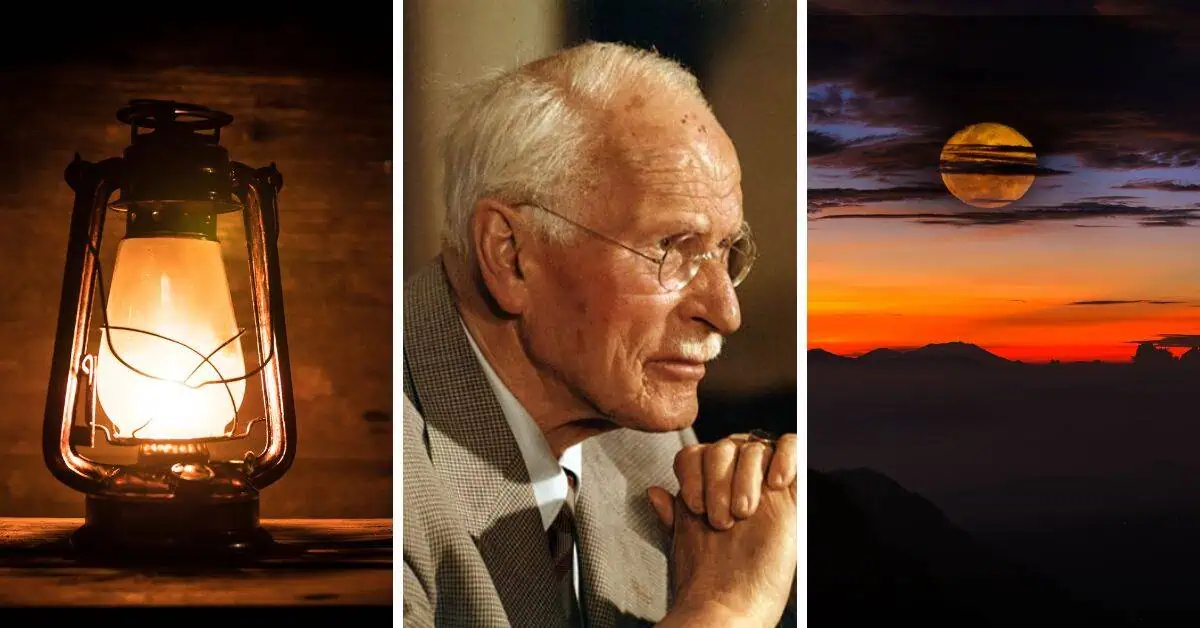I’ve spent over a decade as an MBTI® practitioner watching people light up when they feel seen. It can be life changing to find a sentence, a story, or even a single quote that puts words to something you’ve felt your whole life but never articulated. Carl Jung’s writings do that better than almost anything else I’ve found. Long before we had neat four-letter codes, Jung was mapping the terrain of human nature: our contradictions, our shadows, our flashes of clarity. Over the years, I’ve noticed that certain Jung quotes resonate so deeply with certain personality types that they feel less like observations and more like personal letters. These are the ones that, in my experience, tend to hit home.
Not sure what your personality type is? Take our new personality questionnaire!


ENFJs don’t do surface-level connections. For them, every interaction is an alchemy experiment; two people collide, and if there’s chemistry, both walk away changed. Every ENFJ I’ve known has been fascinated by human connection and the magic that happens when two minds influence and inspire each other.
This quote speaks to their gift for catalyzing transformation in others, but also their openness to being transformed themselves. For ENFJs, that’s the point of relationships: not just to share, but to evolve.
INFJ – “Your visions will become clear only when you can look into your own heart. Who looks outside, dreams; who looks inside, awakes.”
INFJs are seekers at heart. They’re forever scanning life for patterns and meaning. I like this quote for them because I feel like it distills their Ni (Introverted Intuition) in action: clarity doesn’t come from chasing external validation, but from diving inward. Jung’s other line,“As far as we can discern, the sole purpose of human existence is to kindle a light of meaning in the darkness of mere being” feels like its companion piece, a call to turn that inner vision into something that lights the way for others.
INFP – “Loneliness does not come from having no people about one, but from being unable to communicate the things that seem important to oneself, or from holding certain views which others find inadmissible.”
INFPs know this one by heart. Their inner world feels complex and full of fertile ideas and emotions. But it feels like the rest of the world wants a tweet. This quote understands the specific ache of feeling like you’re speaking a dialect no one else seems fluent in.
(But because INFPs deserve more than one option, here’s another):
“The privilege of a lifetime is to become who you truly are.”
This quote affirms what INFPs already know; that authenticity, even when messy, even when it leaves you a mystery to others, is key to a meaningful life and deep relationships.
ENFP – “Show me a sane man and I will cure him for you.”
ENFPs know that “normal” is overrated. This quote celebrates their refusal to sand down their odd edges to fit in. They’re the type most likely to believe that the world is better off with a little eccentricity in it. Jung’s other reminder, “Wholeness is not achieved by cutting off a portion of one’s being, but by integration of the contraries” is another quote I think ENFPs will be inspired by. It tells them that their contradictions aren’t flaws to fix, but essential ingredients in their magic.
As Extraverted Intuitives, ENFPs are drawn to novelty, complexity, what “doesn’t fit” the mold. On top of that, as Introverted Feeling types they believe that everything about a person has both a light and a dark side. They don’t shy away from the messiness and contradiction of life; instead, they explore it.
INTJ – “In all chaos there is a cosmos, in all disorder a secret order.”
INTJs are always looking for the ultimate plan or roadmap for the life they want. They’re also seeking the ultimate meaning of all things. They are strategists and seekers at heart, with a tendency to read between the lines and find patterns that others miss. Their Introverted Intuition sees through the noise, finding the underlying structure everyone else misses. To them, chaos is raw data, waiting to be shaped into a plan.
That’s why the quote, “The meaning of my existence is that life has addressed a question to me… and I must communicate my answer,” resonates so deeply. INTJs live for that question. Why are we here? What’s it all for? How vast is the universe—and what role do humans play in it? These aren’t idle curiosities to them; they’re the compass points guiding everything they do.
INTP – “Thinking is difficult, that’s why most people judge.”
INTPs have a love-hate relationship with this one. On the one hand, it’s a little smug (which they secretly enjoy). On the other, it validates their lifelong habit of wrestling with ideas long past the point where others get bored. INTPs hate jumping to conclusions; they need to understand fully.
Jung’s other words, “As a child I felt myself to be alone, and I am still, because I know things and must hint at things which others apparently know nothing of, and for the most part do not want to know” hit them on a quieter, more personal level. Often INTPs feel that others aren’t interested in the depth and complexity of their thoughts. Their thoughts are too intense, too “controversial”, for others to grasp.
ENTJ – “I am not what happened to me, I am what I choose to become.”
If ENTJs had a creed, this would be it. Life may throw curveballs, but they believe identity is a decision, not a condition. This quote resonates because it puts the locus of control firmly where they like it, right in their own hands.
ENTP – “Mistakes are, after all, the foundations of truth, and if a man does not know what a thing is, it is at least an increase in knowledge if he knows what it is not.”
ENTPs are happiest in trial-and-error environments; sometimes creating the “error” just to see what happens. For them, failure isn’t a setback, it’s a data point, it helps them grow and learn. This quote validates their appetite for exploration and their comfort with chaos as a teacher.
ISFP – “Knowing your own darkness is the best method for dealing with the darknesses of other people.”
ISFPs know that real compassion doesn’t come from avoiding the shadows; instead, it comes from making peace with their own. This is empathy as a lived practice, not a performance. And Jung’s other line—“I don’t aspire to be a good man. I aspire to be a whole man”—is equally resonant, because ISFPs aren’t interested in moral perfection so much as full self-awareness. And that takes time, depth, personal exploration, and an examination of one’s own values, emotions, and motivations. This is where ISFPs excel; they don’t just skirt through life, skating on the surface. They need to fully understand who they are, good and bad.
ISTP – “Often the hands will solve a mystery that the intellect has struggled with in vain.”
ISTPs are kinetic thinkers; they solve problems through motion and experimentation rather than simply musing into the void. They understand that sometimes the body knows what the mind hasn’t figured out yet. Jung’s other line, “The world will ask who you are, and if you do not know, the world will tell you”, relates more to the existential side of their independence: define yourself, or be defined.
ESTP – “You are what you do, not what you say you’ll do.”
For ESTPs, action is the ultimate truth. Plans and promises mean nothing if you’re not willing to step up and do the thing.
And here’s an alternate that ESTPs would also secretly love:
“Life is a battleground. It always has been, and always will be.”
ESFP – “The creation of something new is not accomplished by the intellect but by the play instinct acting from inner necessity. The creative mind plays with the objects it loves.”
ESFPs don’t create because they “should.” They create because their soul would combust if they didn’t. This quote speaks to their need to engage with life playfully, sensually, and joyfully.
(And for their deeper side):
“So now I intend to play the game of life, being receptive to whatever comes to me, good and bad, sun and shadow forever alternating.”
ESFPs believe in living life one day at a time, seizing the moment, being present and fully alive to everything happening right now. This receptivity and openness means they spot many opportunities and meaningful moments that others miss in their rush and distraction!
ISFJ – “Faith, hope, love, and insight are the highest achievements of human effort. They are found—given—by experience.”
ISFJs know wisdom isn’t handed to you; it’s lived into. This quote validates their slow, steady way of moving through the world. They believe in learning through experience and lessons passed down through generations that came before. Ultimately, they know that life is the real teacher more than what can be learned from Facebook feeds, blogs, or secondhand sharing. Finding the nugget of faith, hope, or love in each lived moment is something that they strive for.
ESFJ – “An understanding heart is everything in a teacher, and cannot be esteemed highly enough.”
ESFJs know that you can have all the expertise in the world, but if you can’t connect to people, it won’t matter. This quote honors the emotional labor they pour into every role they take on, whether it’s formal teaching or simply being a steady, understanding presence in someone’s life.
ISTJ – “No matter how isolated you are and how lonely you feel, if you do your work truly and conscientiously, unknown friends will come and seek you.”
ISTJs understand the long game. They know that the value of good work isn’t always immediate, but it builds a kind of invisible network over time. Jung’s other reminder, “Whenever we give up, leave behind, and forget too much, there is always the danger that the things we have neglected will return with added force” is their quiet warning to stay thorough. ISTJs know that caution, attention to detail, and steadfastness are key in a successful life.
ESTJ – “Where your fear is, there is your task.”
ESTJs respect courage over comfort. This quote reads like a challenge they’d willingly accept: if it scares you, it’s probably worth doing.
What Do You Think?
Which of Jung’s words hit you the hardest? Did your type’s quote feel like it was written for you, or did another one unexpectedly stop you in your tracks?
Jung’s insights tap into the parts of us we rarely name but always feel. Sometimes the quote that stays with you isn’t the one that “matches” your personality on paper, but the one that meets you where you are right now.
Other Articles You Might Enjoy:
Look, we all like to think we’re basically good people. We pet the neighbor’s cat, we try to avoid totalitarian regimes, and we say “I’m fine” through gritted teeth so…
Let’s be honest: lately it feels like the world is on fire and the arsonist is live-streaming it for likes. It can be easy to feel overwhelmed just by checking…
Have you ever wondered what would happen if you got on someone’s bad side? Each personality type has defense mechanisms and talents that they can use to take down an…
Personality types and U.S. states—two things you probably never thought to connect, but now that it’s on the table, how can you not? Some states just radiate a certain energy…
We’ve all been there—heart racing, palms sweaty, mind scrambling to find a solution as the clock ticks down. Whether it’s a looming deadline at work, an unexpected crisis at home,…
Do you ever wonder how some of the social norms that we follow in our society got there in the first place? You’re not alone! I recently was in a…





